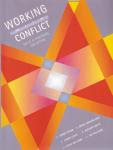The Good Lives Project's concerns are about sustainability, and there is already inequity of climate impacts around the world, and these will become even more stark as global termperatures and sea levels both rise. So the wider field of peace and justice work should be of concern to all of us whose primary focus may be climate change.
For 20 years Woodbrooke has shared its campus with an organisation called Responding to Conflict (RTC). RTC is a non-governmental organisation that works to transform conflict and build peace.
It was founded in 1991 by Simon Fisher, whose 2004 Swarthmore Lecture (Spirited Living: waging conflict, building peace) set out his passion, vision, strategies and hopes for this kind of work.
RTC has its offices at Woodbrooke and uses our residential and conference facilities to run training courses. It has established itself as a leader in the field of conflict transformation and its handbook Working with Conflict: Skills and Strategies for Action is acknowledged as a key resource for practitioners, trainers and academics throughout the world.
RTC has trained practitioners from more than 70 countries, including those where some of the world's most violent conflicts are. It has provided specialist advice and consultancy services to governments, the United Nations Development Programme, and leading international NGOs and charities. It has designed and managed long-term programmes in the Middle East, the Balkans, East Africa and South East Asia, and is currently facilitating and working with partners on programmes in Nepal, as well as providing long-term support to programmes and projects in Kenya and the Middle East.
And my reason for writing about this just now is that last Saturday (12 November) RTC was awarded the Coventry International Prize for Peace and Reconciliation. The Prize aims to recognise groups and individuals who have made a major contribution to grassroots peace-building in situations of conflict around the world. This prize is awarded jointly by the Lord Mayor's Office, Coventry University, Coventry Cathedral and the Diocese of Coventry.
The City of Coventry, along with the Cathedral, has taken a corporate lead on issues of international reconciliation since the bombing of the Cathedral in World War 2. Out of the charred ruins, two symbolic crosses were created (one of wood, one of nails). Crosses of Nails were given to organisations, particularly in Germany, as post-war reconciliation work startedm, and in 1970 the Community of the Cross of Nails was formed, attached to the cathedral, to work for peace, justice and reconcilation.
Growing out of this history are a number of related initiatives. There is an annual Lord Mayor's Peace Festival, supported by the City Council, which has been running for many years under various guises. Coventry University has a Centre for Peace and Reconciliation Studies. The joint working of the City, the University, the Diocese and the Cathedral has led to the current version of the Peace Prize, awarded annually during the Festival.
 The physical Prize that's awarded was designed by Coventry artist and jeweller Rachel Sutton.
The physical Prize that's awarded was designed by Coventry artist and jeweller Rachel Sutton.Professor Alan Hunter, Director of Coventry University's Centre for Peace and Reconciliation Studies, said:
This inspiring choice comes at a time of violence and protest around the world. It is therefore critical to identify and train effective peace-builders, who can return to areas of conflict and place themselves in positions of influence in their own communities. Responding to Conflict does this extremely well, and is therefore a worthy winner.Chair of RTC's Trustees, Cliff Allum sees the award as recognition of the energy, optimism and bravery of the people associated with RTC over the years. He believes the organisation has never been afraid to take up the challenges of addressing conflict, even in areas where many could not see that change was possible. RTC Programme Director, Simon Weatherbed said:
It is a great honour to receive this Prize. Building and sustaining peace is not an easy task and requires long-term commitment. Many of the people we have worked with have continued to transform violent conflicts and countless people’s lives, and in honour of these remarkable people and all who have worked with or supported Responding to Conflict, I am proud to accept this prestigious award.RTC's work will continue and Woodbrooke will continue to support them.




No comments:
Post a Comment